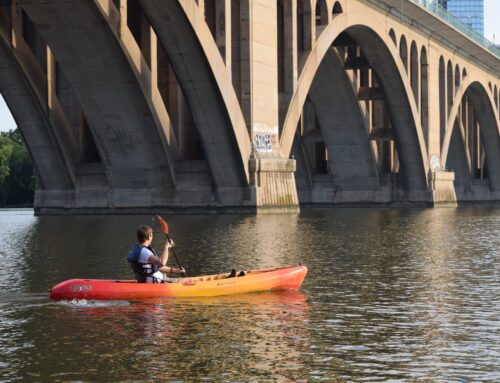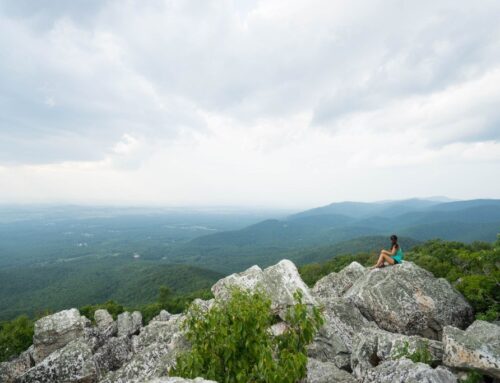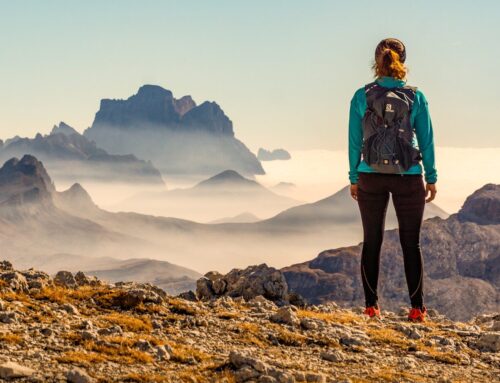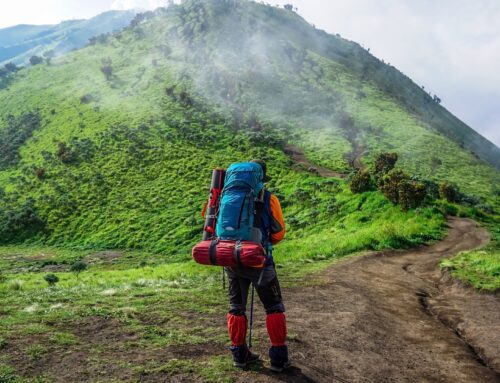Updated June 24, 2021
Want to know a little-known secret about the East Coast? New Hampshire is a mecca for hiking, camping, and backpacking, that has trails comparable to many in the western area of the United States. Not many people know that there are such jaw-dropping, beautiful areas for hiking in New Hampshire, but between the peaks of the White Mountains, the rushing waterways, and the petite but beautiful coastlines of Portsmouth, New Hampshire has basically everything you could ever want in an outdoor adventure. To help you plan an outdoor adventure, we’ve created this guide to some of the must-do hikes in New Hampshire that any hiker will absolutely love.
Things to Know Before Hiking in New Hampshire
Hiking in New Hampshire is wonderful because the trails are generally well-marked, the weather is nice during the warmer months of the year, and the views are spectacular. However, there are a few things you should know before you set out on any hiking adventure:
- New Hampshire’s most popular hiking area is in the White Mountains. While there are plenty of other trails dotted around the state, the White Mountains offer some of the best mountains, waterfalls, lakes, and forests for hikers of all levels. Most of the trails you’ll see on this list are located in or around the white mountains. We’d recommend making a weekend trip out of it and staying a few days in the area to maximize your adventures!
- The best time to go hiking in New Hampshire is in the fall. September and October are prime months for weather and for catching some of the best fall foliage views in the entire country! If you can, plan a hike during the early weeks of October to maximize your fall views.
- Watch out for mud, slippery rocks, and leaves along the trails. Because most of the trails in the area are forested, they can get quite muddy after it has rained. Waterproof hiking boots are strongly recommended for all hikes, as they will protect your feet and ankles on muddy, slippery, uneven surfaces.
- Ticks and mosquitoes are very common in the White Mountains. Ticks can spread all kinds of nasty diseases Be sure to bring strong bug spray, wear long-sleeved hiking clothes, and check yourself and your dogs for ticks once you’re done hiking.
- Winter comes early in New Hampshire. If you’re planning on hiking in October or later, we’d recommend bringing micro spikes, gloves, and a hat (along with other hiking essentials and clothing layers).

Easy Hiking in New Hampshire
Diana’s Baths
- Location: North Conway, NH
- Trail Length: 1.3 miles
- Elevation Gain: Minimal
If you’re looking for quiet forests and beautiful waterfalls with cold pools you can swim in during the summer, Diana’s Baths is one of the best (and most family-friendly) hikes in New Hampshire. Situated just outside of North Conway, this 1.3 mile trail is flat and easy for hikers of all levels, but also provides access to a set of really beautiful waterfalls. They’re a little on the short side, but are very picturesque and are connected by cold pools that are perfect for a midsummer dip. If you’re looking for an easy, short, beginner-friendly hike with some exceptional views, Diana’s Baths is a wonderful place to start.
Basin-Cascade Trail
- Location: Franconia Notch State Park (Lincoln, NH)
- Trail Length: 2.6 miles
- Elevation Gain: 626 feet
One of the most unique rock formations in the White Mountains is located on the Basin-Cascade trail. Part cave, part waterfall, and part forest pond, this strange and picturesque spot is a perfect place for beginners to go hiking in New Hampshire. The trail itself is easy to moderate in difficulty, and runs largely over flat rocks and through beautiful forest areas. As a bonus, if you do this hike in the summertime, you can go swimming or wading in the turquoise pools along the trail as well. It’s a perfect reward for a hot summer hike!

Flume Gorge
- Location: Franconia Notch State Park (Lincoln, NH)
- Trail Length: 1.9 miles
- Elevation Gain: 469 feet
One of the most popular hikes in New Hampshire is through the wooden boardwalks of Flume Gorge, a beautiful, narrow gorge located in the White Mountains area. With jagged, vertical rock formations and a series of streams and waterfall cascades running through it, this beautiful trail takes hikers along a series of boardwalks through the gorge. Many people travel from all over the state with their families to see this natural spectacle, and it’s a trail we’d recommend for hikers of all levels.
Note that hiking in Flume Gorge typically requires a reservation in advance, which you can book here. It’s also not very social-distancing friendly, so be sure to bring a mask and follow pandemic hiking safety guidelines to the best of your ability.
Pondicherry Wildlife Refuge
- Location: White Mountain National Forest (Jefferson, NH)
- Trail Length: 4.9 miles
- Elevation Gain: 147 feet
One of the coolest easy New Hampshire hikes is the trail that runs through the Pondicherry Wildlife Refuge. It’s a very easy walk along a pond in the mountains, but is home to several native fish, reptile, and bird species (including bald eagles) that you can see with enough patience and luck. If you’re there in the early morning or the later evening, you also have the chance to see bears, moose, raccoons, and other mammals that live in the White Mountains. We love this hike because it’s a simple gravel trail that offers beautiful views of the refuge, as well as the nearby mountains off in the distance. For wildlife lovers, it’s a must-do trail!

West Rattlesnake Mountain
- Location: West Rattlesnake Natural Area (Holderness, NH)
- Trail Length: 3.7 miles
- Elevation Gain: 987 feet
If you’re looking for an easy mountain summit trail accessible to beginner hikers, West Rattlesnake Mountain is an excellent spot for hiking in New Hampshire. While a summit hike may sound intimidating, this peak is accessible in just 3.7 miles round-trip, with a very attainable, gradual incline on a well-maintained trail. After a leisurely hike through the forest, this summit offers sweeping views of the valleys below, including Squam Lake and its many tree-filled islands that dot the water.
Not many views in the area have this much variety, from Squam Lake and its islands to the surrounding mountains and forests, so we’d recommend this hike to anyone and everyone looking for a short, easy adventure to a spectacular overlook point.
Little Boar’s Head Scenic Walk
- Location: North Hampton, NH
- Trail Length: 3.1 miles
- Elevation Gain: Minimal
For a change of scenery and pace from the peaks of the White Mountains, head to Little Boar’s Head Scenic Walk for an easy, relaxed stroll along the coastline. Located in North Hampton, NH, this paved trail offers really beautiful and charming views of New Hampshire’s tiny coastline and its rocky shores. Lined with cute homes and giant mansions on one side and the sea to the other, this easy and accessible hike is perfect for anyone looking for some fresh air and stunning views along the water.

Moderate Hikes in New Hampshire
Artist Bluff & Bald Mountain
- Location: Franconia Notch State Park (Franconia, NH)
- Trail Length: 1.5 miles
- Elevation Gain: 436 feet
Hailed as one of the most beautiful views in the White Mountains, Artist Bluff sits on the edge of Bald Mountain and is accessible on a moderate hike. While the trail is only 1.5 miles, it really packs a punch in terms of rocky uphills, pretty forest areas, and of course, rocky outcroppings that offer stunning views of the surrounding mountains and nearby Echo Lake. This is an extremely popular hike, so we’d recommend getting here early in the morning or avoiding weekends, especially during the fall when the views are especially magical.
Read More: How to Hike the Artist Bluff Loop in Franconia Notch State Park

Arethusa Falls
- Location: Crawford Notch State Park (Bartlett, NH)
- Trail Length: 2.8 miles
- Elevation Gain: 784 feet
With views of one of the most beautiful cascades in the state, the Arethusa Falls trail is one of the best waterfall hikes in New Hampshire. Clocking in at just under 3 miles, this moderate trail offers ~2 hours of trails that pass by several waterways and falls as it leads hikers to the big spectacle – Arethusa Falls. This hike is best done after some rain, as the falls flow much more powerfully and make sure a more pleasant, scenic experience. However, note that the trail can get quite muddy and slippery, so wear solid waterproof hiking boots with good tread to keep yourself safe and dry along the way.
Mount Major
- Location: Major Mountain State Forest (Alton Bay, NH)
- Trail Length: 3.7 miles
- Elevation Gain: 1,148 feet
Located in the central part of New Hampshire near Lake Winnipesaukee, Mount Major is a wonderful summit hike perfect for beginners wanting an extra challenge or more experienced hikers wanting to break free of the White Mountains (without compromising on views). In the right conditions, you can hike above the clouds on this peak trail, where you can see beautiful views out to the lake and its islands on clear days. It’s a popular trail, especially given its proximity to large metropolitan areas like Boston, but it’s absolutely worthwhile!

Lonesome Lake Trail
- Location: Franconia Notch State Park (Lincoln, NH)
- Trail Length: 3.1 miles
- Elevation Gain: 1,026 feet
As one of the more popular hikes in New Hampshire, this moderate trail follows a steep incline through the White Mountains to the scenic, mirror-like Lonesome Lake. Surrounded by mountains and beautiful forests, there are few places more picturesque or serene than this! The trail begins at the Lafayette Place Campground (near the start of Franconia Ridge, but across the highway!), and climbs upward to reach the lake. Best done in the fall, you’ll be rewarded with stunning, colorful foliage views and crisp mountain air. Go early if you plan on hiking on the weekends – this is one of the most popular trails in the area and it fills up quickly!
Mount Pemigewasset
- Location: Franconia Notch State Park (Lincoln, NH)
- Trail Length: 3.7 miles
- Elevation Gain: 1,253 feet
Locally known as Indian Head, the Mount Pemigewasset trail is one of the best short New Hampshire hikes in the White Mountains. It’s a pretty short, quick hike, but the views from the top of the mountains and the highways running through them are nothing short of spectacular. For experienced hikers, you can get to the top in around an hour, which is perfect for a hike to pair with other peaks in the area or for hiking at sunrise or sunset. This works well because it’s pretty crowded during the day, meaning you’ll get great views and fewer crowds by hiking early in the morning or later in the afternoon.

Welch Dickey Loop
- Location: White Mountain National Forest (Thornton, NH)
- Trail Length: 4.3 miles
- Elevation Gain: 1,774
If you’re looking for a moderate to difficult summit hike that’s a bit shorter in distance, the Welch Dickey Loop is a fantastic option. As one of the best hikes in New Hampshire for viewing fall foliage, the Welch Dickey Loop offers stunning panoramas of the nearby mountains. The trail is a loop that summits 2 mountains, Welch and Dickey, and passes over several forested areas and rocky ridges as well. There are steep grades, rock scrambles, and exposed cliffsides for a thrilling, challenging adventure. Note that this hike is extremely difficult and dangerous in wet conditions (as the rocks get too slippery to cross), so we’d recommend it for sunny and clear days only.
Read More: How to Hike the Welch & Dickey Loop Trail – A Complete Guide

Difficult Hikes in New Hampshire
Franconia Ridge & Mount Lafayette
- Location: White Mountain National Forest
- Trail Length: 8.6 miles
- Elevation Gain: 3,822 feet
If you’re going to do any hike in the White Mountains, Franconia Ridge is it. As one of the most difficult and spectacular day hikes in New Hampshire, this trail takes you to the peak of 3 of the state’s mountains and offers arguably the best views in the entire White Mountain National Forest. This trail isn’t for the faint of heart, though – there are several areas with extremely steep grades, rocky traverses, and windy ridge lines that require ample experience and grit to push through. For those willing to take on the challenge, however, Franconia Ridge is a fantastic day-long hike you’ll certainly never forget.
Read More: Hiking the Franconia Ridge Loop Trail in White Mountain National Forest
Mount Monadnock
- Location: Monadnock State Park
- Trail Length: 4.3 miles
- Elevation Gain: 1,627 feet
For more experienced hikers, Mount Monadnock is one of the most popular and challenging New Hampshire hikes. As one of the most popular summit trails in New England, the trail does tend to get quite crowded, especially in the warmer months. Requiring some serious scrambling and steep ascents, this short hike is definitely not for beginners or the faint of heart. However, if you’re up for the challenge, you’ll be rewarded with stunning views and a huge sense of accomplishment at the summit.

Mount Washington via Lion’s Head & Tuckerman Ravine
- Location: White Mountain National Forest
- Trail Length: 7.9 miles
- Elevation Gain: 4,169 feet
Topping off at 6,288 feet of elevation, Mount Washington is the highest mountain in the Northeast and is one of the most famous in the country for its dangerous traverses and unpredictable weather. Summiting this mountain by foot is a rite of passage for many New England hikers, and is something that requires lots of preparation and training. While the top is accessible by car and train, hiking up offers some of the most exhilarating and spectacular views that the White Mountains have to offer. It’s one of the most iconic places for hiking in New Hampshire, and definitely a bucket list-worthy adventure.
Despite its relatively short elevation compared to its western counterparts, Mount Washington is infamous for its many hiker deaths and rescues over the years and has earned its reputation as the “most dangerous small mountain in the world.” Yup, that means that hiking up this mountain is only suitable for extremely experienced and physically fit hikers who know how to scramble and hike through potentially temperamental weather conditions.

Presidential Traverse
- Location: White Mountain National Forest
- Trail Length: 20.4 miles
- Elevation Gain: 8,211 feet
If you’re looking for a real challenge that takes stamina and grit, the Presidential Traverse is possibly the most challenging and thrilling of all of the New Hampshire hikes. This trail traverses 8 peaks (all named after presidents) along the White Mountains. It’s 20.4 miles of constant elevation change, which can be done in a very long day hike or split over a few days as a backpacking trip.
While this is a one way hike, there is usually a shuttle that connects the two ends of the trail (be sure to check here for the latest shuttle updates and schedules).
Additional Resources for Hiking in New Hampshire
What to Pack
- Breathable hiking clothes – For warmer hikes, you’ll want to wear a sweat-wicking shirt and breathable pants, like these Patagonia hiking shorts for men and women. For cold-weather hikes, we recommend dressing in layers, including merino wool baselayers for men and women, a down puffer jacket for men and women, and a Northface waterproof outer shell for men and women (a must for hiking in Seattle). And don’t forget a pair of the best women’s and men’s hiking socks!
- Trekking poles – You won’t need these for every single hike, but we suggest throwing them in your car just in case. We recommend the Black Diamond Trail Ergo cork trekking poles, which are lightweight, easy to transport, and durable.
- Water bottle – Having water available at all times is a huge must. To limit disposable plastic, we recommend bringing your own refillable water bottle. We’re obsessed with Hydro Flask water bottles because they keep water cold for hours.
- Sunscreen and bug spray – Sweatproof sunscreen and DEET bug spray can help you avoid sunburn and bug bites, two of hiking’s most annoying after-effects. Our favorite kind of sunscreen is Sun Bum, as it is free of harsh chemicals and safe for marine life, including coral reefs.
- A brimmed hat or cap – The sun can be brutal in open hikes, so always pack a brimmed hat or cap for day hikes in the sunshine.
- Emergency blanket and first aid kit – We’d strongly recommend bringing a first aid kit and a lightweight emergency blanket on every hike. Why? Because the unfathomable can happen, and it’s always best to play it safe.
- Durable day pack – A durable day pack is the perfect spot to stash all your hiking gear. While any backpack will do, we recommend the Osprey Tempest 20 or the Talon 22 day packs because they’re comfortable and breathable for long hikes. For more information, check out our best day packs for any terrain guide.
Wondering what exactly you should pack for your next hike? Visit our Complete Day Hiking Packing List for our full list and our top gear recommendations.
Related Articles
- 15 of the most Beautiful Hikes in New England to Do This Fall
- 15 Incredible Hikes in Maine For All Levels of Experience
- 15 Gorgeous Hikes in Vermont You Need to Do ASAP
- The Ultimate Day Hiking Packing List
- 35 Practical & Clever Gifts for Hikers That They’ll Actually Use
- 55 Hiking Quotes to Inspire Your Next Outdoor Adventure






